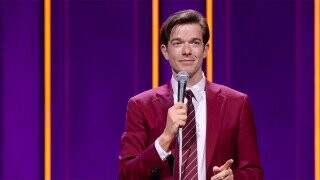John Mulaney Had Notes for the Comics Who Did His Intervention

In all fairness, anyone who Zooms into an intervention could use a little constructive criticism.
In his Emmy-nominated hour Baby J, John Mulaney mythologized the moment when a dozen of his closest friends confronted him about his drug addiction — via video conferencing, for some of them. Woven into the narrative of his last few hours of drug abuse was the palpable, uncomfortable energy of a room (or Zoom meeting) full of comedians who promised each other that they would suppress their comedic instincts in order to save a loved one from himself. The full story of the evening-long affair is more dour and unpleasant for Mulaney than the abridged version he edited for his act, but there are a couple hilarious details from the true story that didn’t make it into the Netflix adaptation. Namely, after each member of the intervening party read their letter to Mulaney explaining how his addiction affected them, Mulaney gave them notes on their performance. Then, once the night was nearing its end, he ranked them against each other.
Don't Miss
Speaking to Deadline on Monday, Mulaney explained how he grew to see the comedy potential of his intervention in the weeks following the harrowing ordeal with the help of his friend and fellow comedian Joe Mande, saying, “He said it was extremely funny that I was giving notes on each person’s letter after they read it and that I told him after the intervention, how I ranked the speeches.” I have a hunch that there was a tier at the bottom exclusively for the webcam ones.
When asked if he was mentally taking notes for his next special mid-intervention, Mulaney plainly replied, “No. I wish I had a more wily mind, but no, it was just a bad moment. And I’m someone who through every single thing that’s ever happened in my life, have known it would be funny somehow. It was more the chemical hell that took that away.” Mulaney further explained what was made more comical in Baby J when he showed up to the “dinner party” and realized what was in store, saying, “I was quite under the influence when I arrived. I was both high and unable to keep using because they wouldn’t let me go to the bathroom. So I was in a very agitated state.”
As for the process of converting the ordeal into comedy fodder, Mulaney says he took an ask-for-forgiveness-instead-of-permission approach to his on-stage portrayal of the events in question and the people involved in the intervention. “I cleared it by performing it and then asking, ‘Hey, was that okay?’” he stated.
Apparently, the interveners themselves weren’t all that concerned with jokes like the one in which Mulaney said that he knows which 8 of the 12 friends assembled could have stayed home for the whole thing — instead, they were worried about their own image. “A friend of mine said, ‘How come when you tell the story, you are cool and we are all lame?’” Mulaney recalled. “And they were right. I said, ‘Because I’m telling it from that little bastard’s perspective where I was the coolest guy in NYC that night and you guys were completely bringing me down.’”
I have to think that Mulaney's notes on his friends' contributions to the intervention were slightly more scathing than their response to Baby J — maybe, if he can still recall his critiques, he can Slack them to his saviors.